Ever wondered why your grandparents always had a stash of herbs in their kitchen for upset stomachs? The answer might surprise you. Using natural remedies for your digestive health is more effective than you think. In this article, we’ll explore herbal remedies for stomach issues.
From soothing herbs for digestion to natural digestive relief options, these solutions can make a big difference. They are time-tested and have been helping people for generations.
Get ready to learn how adding these powerful herbs to your diet can improve your gut health. Stay tuned as we reveal the secret ingredients that have been soothing tummies for years.
Quick Recommendation: Our blog covers the best herbs for digestive health. If you want to explore the world of herbs more comprehensively, we recommend the Herbs for Health eBook.
Understanding Digestive Health
Gut health is key to overall well-being. Your digestive system breaks down food, extracts nutrients, and removes waste. It’s vital for your body to function well every day.
Conditions like irritable bowel syndrome (IBS), acid reflux, and constipation can really affect your life. Knowing about these and how to care for your digestive system is crucial. Eating a balanced diet, staying hydrated, and exercising regularly are important for your gut health.
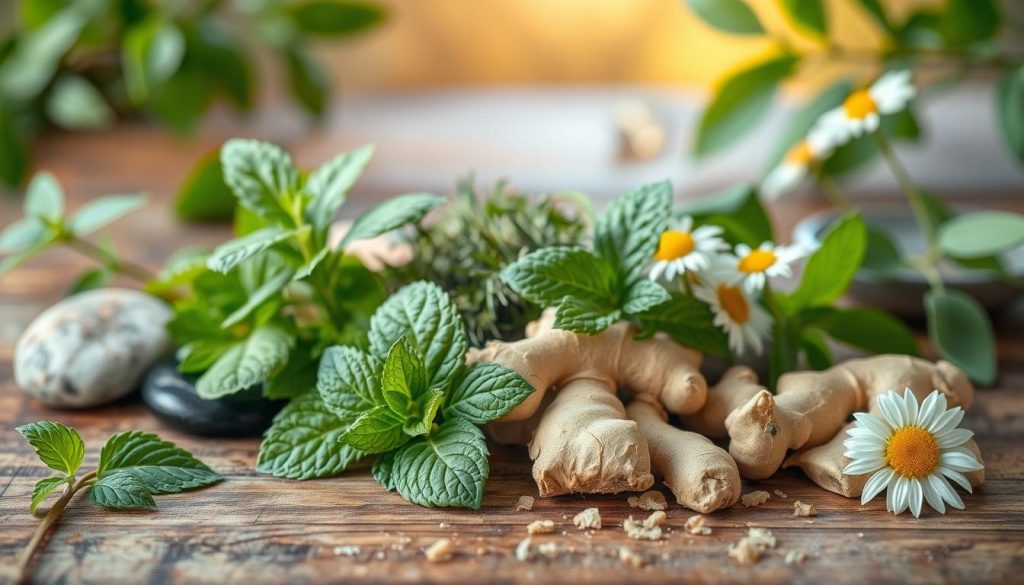
Digestion does more than just absorb nutrients; it also affects your immune system and brain. A healthy gut is called the body’s second brain, showing its big role in mental health. Taking care of your digestive system can lead to many health benefits, reducing the risk of chronic diseases and improving your life quality.
Peppermint: A Natural Digestive Aid
Peppermint is known for its amazing benefits as a natural digestive aid. It helps a lot with relieving indigestion. The menthol in peppermint leaves soothes the stomach, which is great for IBS, bloating, and other stomach issues.
Peppermint relaxes the stomach muscles. This makes digestion easier and more comfortable.
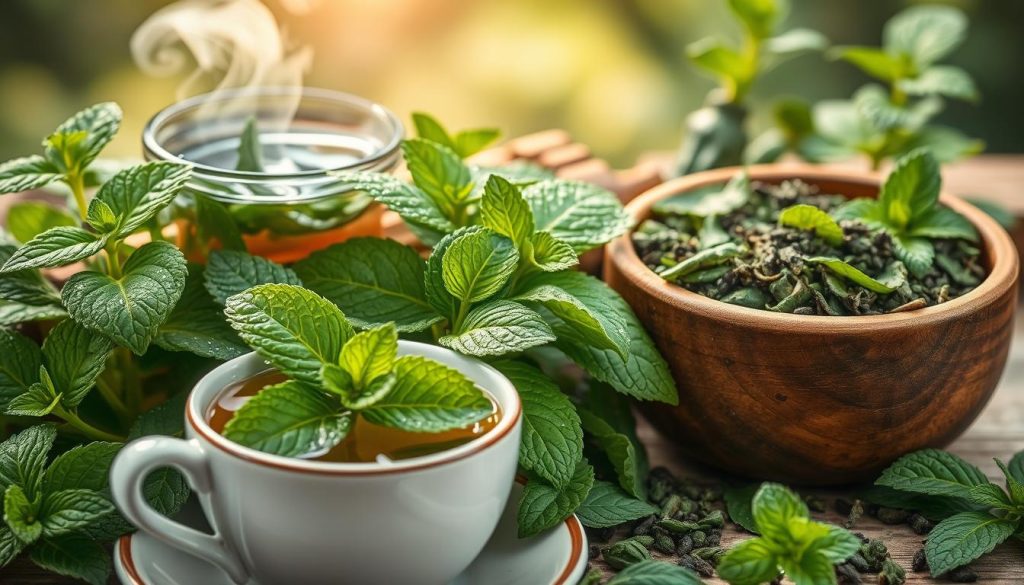
Peppermint is not just tasty and fragrant. It also helps a lot with indigestion. Studies show that peppermint oil can lessen IBS symptoms and other stomach problems.
Whether you like peppermint tea, capsules, or oil, adding it to your daily routine can boost your digestion. It’s a natural way to feel better.
Experts from Johns Hopkins Medicine say peppermint is great for stomach issues. They say it’s proven to work. So, if you’re feeling bloated or have indigestion, try peppermint. It’s a natural way to feel better.
Ginger: The All-Rounder Herb
Ginger is known for its many uses in health. It’s especially good for *ginger for nausea*. It helps with morning sickness, post-operative nausea, and motion sickness. Studies show ginger can greatly reduce nausea symptoms.
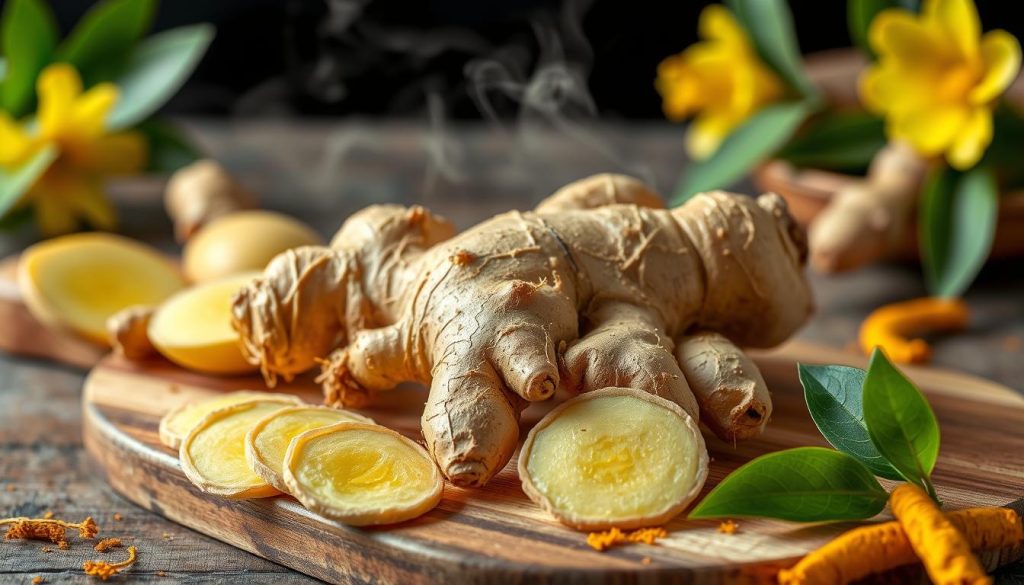
Ginger is also a top *anti-inflammatory herb*. It has compounds like gingerol that fight inflammation. This is good for your digestive health and conditions like arthritis.
Ginger also supports your digestive system. It can ease bloating, gas, and indigestion. You can add it to teas, smoothies, or use it as a spice.
Adding ginger to your daily life can improve your health. Try it in teas, supplements, or cooking. This versatile herb can help in many ways.
Fennel: More Than Just a Spice
Fennel is more than just a flavor enhancer in your cooking. It’s also a key player in digestive health. Its carminative properties help with bloating and ease stomach spasms.
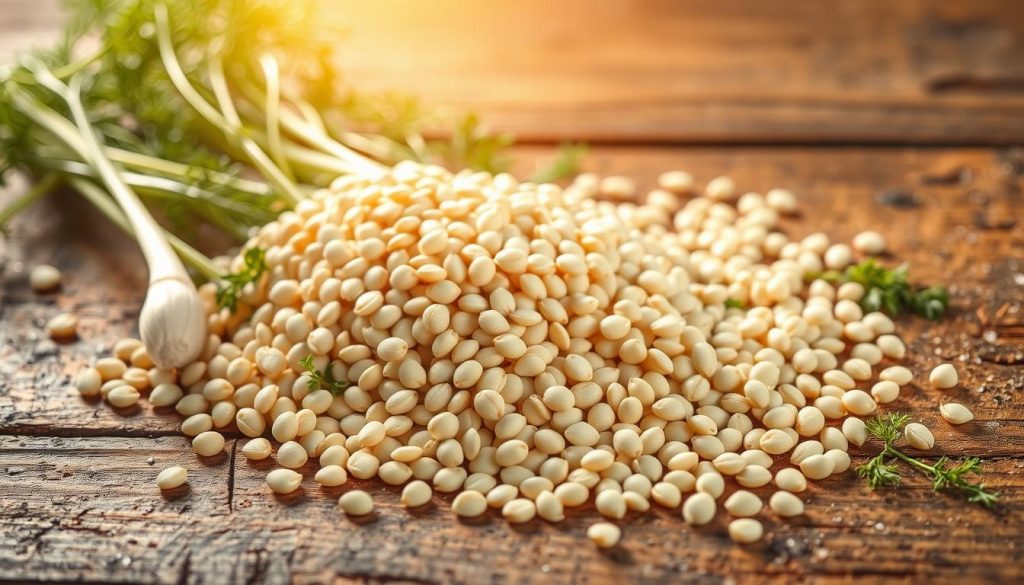
Fennel seeds are great for your stomach. They can help soothe digestive issues naturally. You can chew on the seeds, drink fennel tea, or add it to your food. This can calm your digestive system.
Studies show fennel helps keep your gut healthy. It reduces bloating and improves digestion. Adding fennel to your digestive routine can greatly improve your gut health.
Chamomile: The Soothing Herb
Chamomile is known for its calming effects. It’s a top choice for relaxation and easing digestive issues. Drinking chamomile tea can soothe an upset stomach and help you relax after a long day.
Chamomile tea contains flavonoids and terpenoids. These compounds help with inflammation, spasms, and sleep. This makes chamomile great for when you need digestive relief.
But chamomile’s benefits don’t stop there. It also helps reduce anxiety and improve sleep. So, if you’re feeling stressed or having trouble sleeping, try chamomile tea. It’s a great addition to your herbal remedies.
Quick Recommendation: Our blog covers the best herbs for digestive health. If you want to explore the world of herbs more comprehensively, we recommend the Herbs for Health eBook.
Dill: An Underrated Digestive Herb
Dill is often overlooked when talking about digestive health, but it’s very beneficial. It’s great for easing gas and has been used for centuries. Many cultures have found it helpful for stomach issues.
Adding dill to your meals is simple and natural. Studies show it helps with digestion and reduces bloating. Its gentle compounds make it a reliable choice for soothing the stomach.
When looking for a natural gas remedy, think of dill. You can use it in salads, teas, or as a seasoning. Its flexibility makes it a great addition to your digestive health routine.
Turmeric: The Golden Spice
Turmeric is known as the “Golden Spice” and is a big help for your digestive health. It has a yellow color and contains curcumin, which fights inflammation well. Eating turmeric can help keep your gut healthy.
Turmeric is great because it reduces inflammation in your digestive system. This is good for people with irritable bowel syndrome (IBS) or other inflammatory diseases. It helps soothe your digestive system.
But turmeric does more than just help with digestion. It might also help prevent and treat diseases because of its curcumin. Curcumin is an antioxidant that protects your cells and keeps your gut healthy.
Adding turmeric to your meals is easy and tasty. You can put it in soups, stews, smoothies, or on roasted veggies. This way, you get the benefits of turmeric and make your food more flavorful.
When you want to spice up your diet, think of turmeric. It’s not just good for your digestion. It also offers many health benefits that make it a must-have in your kitchen.
Licorice Root: Sweet and Beneficial
Have you ever tried licorice root? It’s not just tasty; it’s also great for your stomach. It’s known for soothing your digestive system and helping with ulcers naturally.
Licorice root is famous for calming down your stomach. It’s one of the best herbs for soothing your gut. If you often feel stomach pain, adding licorice root to your diet might help.
Licorice root is also good for treating ulcers. It has anti-inflammatory properties that help heal ulcers. But, be careful not to take too much, as it can raise your blood pressure. Using deglycyrrhizinated licorice (DGL) can help avoid this problem.
Adding licorice root to your meals can make your stomach happier. It’s a natural way to improve your digestive health. Whether you’re looking for a natural remedy or just want to feel better, licorice root is a great choice.
Conclusion
As you work on bettering your digestive health, adding these herbal remedies can make a big difference. Peppermint gives quick relief, while ginger offers a wide range of benefits. These herbs help support a healthy stomach.
Each herb has its own special benefits. Fennel helps with bloating, chamomile calms you down, and dill is a hidden gem. Turmeric fights inflammation, and licorice root soothes your stomach.
By adding these tips to your daily routine, you can greatly improve your digestion. Whether it’s peppermint tea or turmeric in your food, choosing the right herbs is key. Start using these natural remedies and see how they can enhance your digestive health.
Quick Recommendation: Our blog covers the best herbs for digestive health. If you want to explore the world of herbs more comprehensively, we recommend the Herbs for Health eBook.

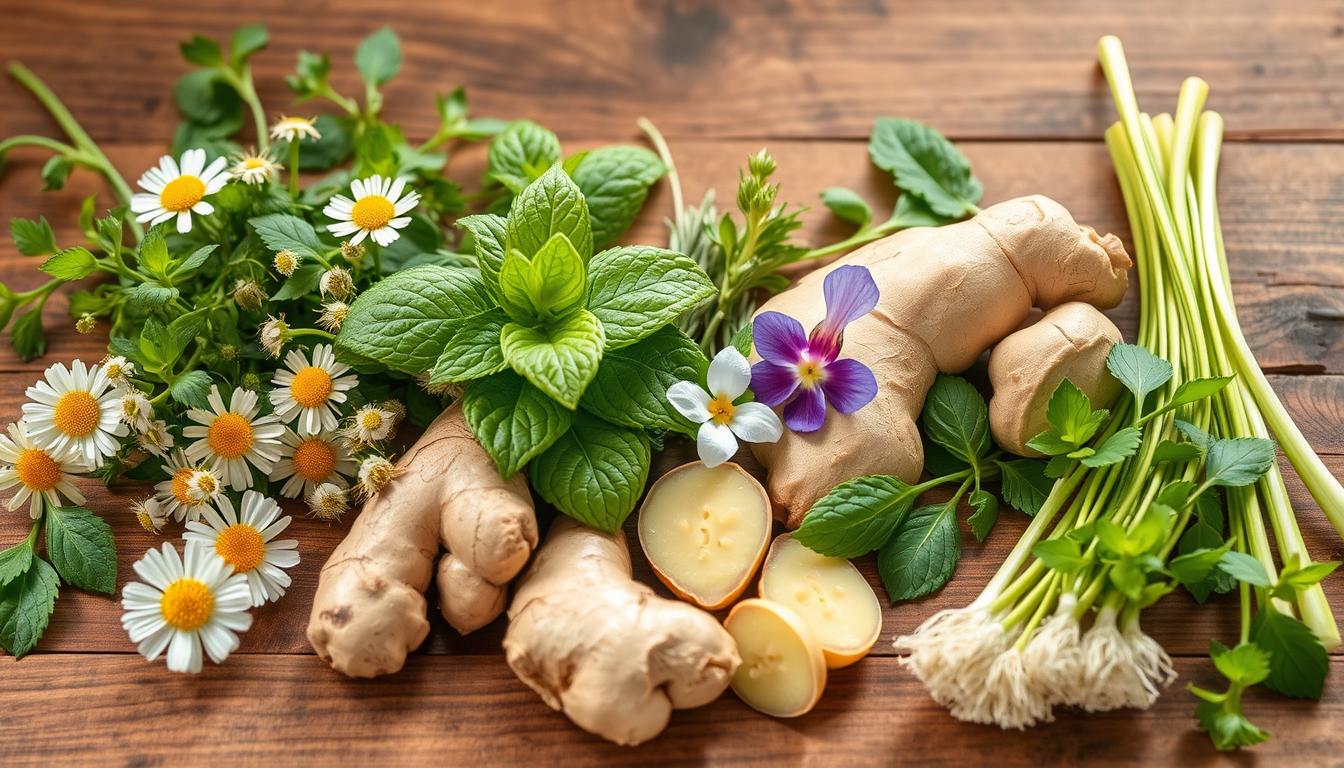
Your point of view caught my eye and was very interesting. Thanks. I have a question for you.
Thank you for your sharing. I am worried that I lack creative ideas. It is your article that makes me full of hope. Thank you. But, I have a question, can you help me?